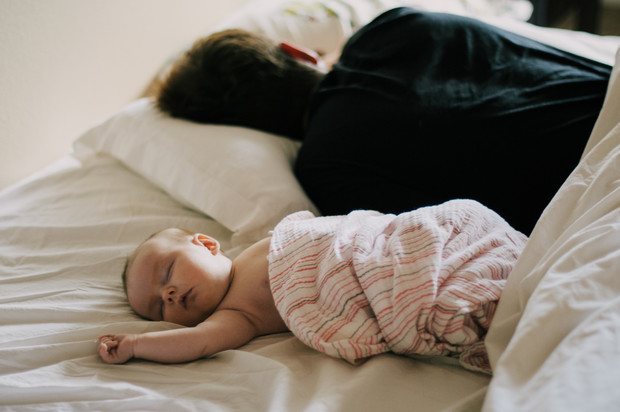Any parent wants to see their child happy, well-rested, cheerful and cheerful. Healthy sleep is very important for a baby. However, all children are different, and their sleep patterns are different: some hardly sleep, while others are sleepyheads and are ready to spend a long time in the crib. Is it normal for a child to sleep all day?
Healthy sleep is very important for babies
Features of newborn sleep
If an adult immediately falls into deep sleep after falling asleep, a baby in the first months of life enters it through the REM sleep phase, which lasts a couple of tens of minutes. During this period, he can easily wake up, so the baby needs adult help to fall asleep. After this, the small twitching of the muscles stops - they are relaxed, the fists straighten. In this state, the baby can be transferred to a crib for a long nap.
After about an hour, the baby's eyelids will begin to flutter again, breathing will become faster, and the arms and legs will move. The time for REM sleep comes again; if the baby does not wake up during these 10 minutes (for example, due to hunger), he will easily go back into deep sleep.
How long should a baby sleep per day?
Each child is individual, but on average, a newborn baby is “supposed” to sleep from 14 to 18 hours a day, the number of dreams and their total duration change as the toddler grows up.
Newborn sleeps most of the day
Until the age of three months, babies sleep almost all the time - a total of 17 to 18 hours; at the threshold of 4 months of life, the total duration of sleep approaches 15 hours.
In the next 90 days of life, most babies interrupt daytime wakefulness with 2-3 naps, plus 10-11 hours of sleep at night (with waking up to eat). After 6 months, babies (not all) are able to go through the night without waking up.
Sleep norms for a newborn baby
Amount of daytime sleep according to normsDaytime sleep norm in hoursWakefulness norms in hoursNorm of night sleep in hoursDaily sleep requirement in hoursAge 1-3 weeks from birth
A newborn baby gets used to the rhythm of the world around him. He does not sleep according to a strict schedule and may wake up earlier or later than expected. The baby, as a rule, only eats and sleeps in the first three weeks of life. During the day, newborns sleep for 8-9 hours. During the 4 hours of active life, the baby eats. Don't forget that he needs to be fed every 1.5-2 hours. A baby's night sleep can last 10-12 hours. At the same time, he can wake up 3-4 times during the night to eat. Night for a child of this age begins at 9 pm and lasts until 9 am. During the first weeks of his life, the baby sleeps approximately 18-20 hours a day.Age 1-2 months from birth
At this age, the baby sleeps less. He develops 4 daytime sleep periods and one nighttime sleep period. Daytime sleep time is 8 hours. It is divided into several periods: two for 2-3 hours and the next for 30-45 minutes. The child’s active life time is 4 hours. A stable night sleep pattern appears - 10 hours each. Mommy can get up 2 times at night to feed. Babies sleep 18 hours a day.Age 3-4 months
The number of periods of daytime sleep stabilizes and becomes 4 times a day. Children sleep for 6-7 hours during the day. The first two periods of sleep last 2-3 hours, the other two 30-45 minutes. The so-called superficial sleep. Waking time is 7 hours. At night, babies sleep for 10 hours. They need to be fed twice a night. The child should sleep 17-18 hours a day.Age 5-6 months
By 6 months, the child should get used to sleeping 3 or 2 times during the day. A 5-month-old baby needs 6 hours to sleep during the day. In this case, the baby should sleep three times during the day - two periods of 2 hours and one of an hour. A 6-month-old baby needs 5 hours of sleep during the day. They need to be divided into two periods of 2.5 hours each. Your baby will “walk” for 8-9 hours. Your baby needs 10 hours of sleep at night. By the age of 6 months you need to feed once at night. The baby must sleep 15-16 hours a day.Age 7-9 months
The child switches to two daily naps. At this age, the child has enough sleep 2 times for 2.5 hours, that is, 5 hours in total. Babies are on the move for 9-10 hours. The norm for night sleep is 10-11 hours. The norm for daily sleep is 15 hours.Age 10-12 months
The baby also sleeps twice a day, but sleep time is reduced. The child requires two naps per day for 2 hours. Total - 4 hours. The baby's active period per day is 10 hours. The child will need 10 hours to sleep at night. The child should sleep 14 hours per day.Why does my baby sleep all day?
Parents, of course, are happy when their baby lets them sleep, but if a small child constantly sleeps all day, they begin to worry and look for possible reasons for this. They can be either harmless or dangerous to the baby’s health.
Problems with breastfeeding
The child does not sleep all day - reasons and ways to eliminate them
According to WHO recommendations, breastfeeding on demand is ideal for a healthy baby, i.e. with free access to the chest at any time of the day. However, it is not always possible to establish breastfeeding. If the baby practically “hangs” on the chest constantly and does not gain weight, most likely he is not eating enough. Also, the baby may suck poorly and rarely require milk, because he does not have enough strength. Such a child will basically sleep “quietly” all day, but this is only due to weakness and lack of nutrition and fluid in the body.
Important! In this situation, dehydration, jaundice or hypoglycemia may develop, which will cause even greater drowsiness and result in hospitalization.
Therefore, a sleepy “lazy” child, if the duration of sleep is exceeded, must be woken up and taught to suck the breast so that he understands the connection between the unpleasant sensations of hunger, sucking milk and the subsequent pleasant feeling of satiety and contentment.
Difficult birth
The first test that a baby faces in post-uterine existence is the process of childbirth itself. Sometimes it can be so difficult and exhausting that a new person must gain strength for a long time; this is best done in a dream. In addition, the use of medications (especially for anesthesia) during childbirth can also cause drowsiness and weak sucking, leaving the baby lethargic for several days and unable to coordinate breathing and swallowing mother's milk. Therefore, it is quite normal for a newborn after a difficult birth to sleep all day.
Confused day and night
Another reason for the baby’s not entirely normal sleep pattern is that he simply confused night and day: at night he is alert and cheerful, and during the day he sleeps off. At the same time, such an inverted order of affairs does not bother the child (he is playful, active, his appetite is fine), but the parents are deprived of strength and a good night’s rest (as a result, they become increasingly chronic fatigue, irritability and inattention).
To prevent such confusion, you should not allow your baby to sleep during the day between feedings for more than 4 hours; the longest periods of sleep should occur at night, when melatonin and growth hormone are more actively produced.
After illness
Almost all small patients, after suffering from infectious and other diseases (accompanied by fever and other unpleasant symptoms), look exhausted and sleepy. In this way, the baby’s body, weakened by attacks from harmful microbes and viruses, restores vital energy. Latent infection also contributes to disruption of circadian sleep rhythms.

After illness, the baby can sleep all day long
Additional Information. If the illness was accompanied by a runny nose and nasal congestion, a constant cough, and the child simply could not sleep normally because of them, then after these symptoms subside, he will make up for lost time.
Other Possible Causes
There may be more harmless reasons for children taking too long naps during the day. For example, when the day before the baby spent the whole day without rest: he became very overexcited and lost energy, then in the “bedtime” he simply replenishes it and then sleeps as usual. Weather changes can also cause increased sleepiness in young children (especially weather-sensitive ones).
What to do if your baby has confused day with night
One month old baby doesn't sleep all day
If an infant begins to stay awake at night and sleep during the day, it is necessary, first of all, to determine the cause of such a failure in the regime.

The baby mixed up day and night
If these are symptoms of painful conditions (colic, pain, runny nose), consultation with a pediatrician and prescribed adequate treatment will help.
When health problems are excluded, the most effective, but time-consuming advice is to not let the child fall asleep during the day. If the problem concerns children of the first year of life, it is enough to temporarily remove one of the daytime naps so that he does not sleep for at least 4 hours before the start of night sleep.
In general, from birth it is recommended to teach the baby to distinguish between day and night, developing in him the concept that day is when it is light and noisy, and night is dark and quiet.
At 1 month
Newborn babies benefit greatly from “white noise” (similar to intrauterine sounds, which the baby still associates with peace and pleasure), on its own or superimposed on quiet, calm classical music.
Complete darkness is necessary for proper sleep, so it is undesirable to use even the dimmest nightlights. They can be turned on when the mother gets up to feed the baby. It is also advisable to have thick curtains or blinds on the windows so that the child is not disturbed by bright street light.
At 3 months
Often a 3-month-old baby begins to suffer from colic, so at this age, for a comfortable night's sleep, it is very important to follow the diet: do not overfeed at night and provide enough moisture.
Overheating is also unacceptable, so the air in the room where the baby sleeps must be cooled. Walking in a stroller is very good for falling asleep at night - many babies rock well.

Kids fall asleep well after an evening walk in the fresh air.
If a 3-month-old baby sleeps all day, it is necessary to organize comfortable conditions for him to have a good night's sleep and fall asleep easily: the baby should not be overfed, not wrapped up, the bed and pajamas should be very soft and not restrict his body.
You can use aromatherapy (in the form of a few drops of mint oil in an aroma lamp or when bathing a child), and also place a sachet pillow with “sleepy” herbs near the crib.
At 4 months
At this age, a small child is more and more awake during the daytime, therefore, when confusion between day and night occurs, he should be loaded as much as possible during daylight hours, while it is advisable to minimize daytime sleep (only in case of visible severe fatigue). To keep your toddler active, you can use:
- funny and playful children's songs;
- do a light massage and turn over on your tummy;
- new toys;
- constant conversations, nursery rhymes, jokes.
For older children, you can increase physical activity: this includes gymnastics (according to age), outdoor games, swimming and walks.
Note! After consultation with a pediatrician, it is possible to use soothing teas and decoctions for better sleep in the evenings.
What about daytime naps?
Daytime and nighttime sleep are regulated by different mechanisms, so during the day it doesn’t matter whether the bedroom is lit or not. The problem may be different: can the baby sleep in a bright bedroom? Experts recommend darkening the room while the baby is sleeping, since this step will allow the baby to:
- reduce the level of stimulation;
- create a familiar environment (mood) for sleep.
In the first months of life, babies can sleep anywhere, but after 4-5 months the situation changes radically: the child’s activity increases, and interest in everything around him appears. How can you sleep when the bedroom is lit and you can see so many interesting things: patterns on the wallpaper, toys, you never know what can attract you to take out the crumbs. Therefore, parents should close the curtains and thereby reduce the level of visual stimulation for the child.
There is no need to completely darken the bedroom during daytime sleep. Complete darkness is not a prerequisite for quality daytime rest for a child. One hundred percent darkness is needed when sleeping at night. During the day, the curtains can be closed loosely to let in some sunlight. The very fact of preparing the room is a signal to the baby that he needs to get ready for sleep. Good daytime sleep requires preparation and attitude.
Be sure to make sure that the curtains in the bedroom are light-proof, and also check whether certain elements of the equipment glow at night. Roller blinds, blinds, and blackout curtains are suitable for a child's bedroom.
Do you want your child to have a good sleep? Make his bedroom completely dark at night and comfortable during naps.
Table of sleep norms for children under one year old
2 month old baby does not sleep day or night
American scientists, having brought together the opinions of neurologists, pediatricians and psychologists, have compiled approximate recommendations for the duration of sleep and wakefulness for young children.
Sleep standards for babies up to one year old
| Age, months | Duration of sleep per day, hour. | At night | During the day | Number of daytime naps |
| 1 | 15-18 | 8-10 | 6-9 | 3-4 |
| 2 | 15-17 | 8-10 | 6-7 | 3-4 |
| 3 | 14-16 | 9-11 | 5 | 3 |
| From 4 to 5 | 15 | 10 | 4-5 | 3 |
| From 6 to 8 | 14,5 | 11 | 3,5 | 2-3 |
| From 9 to 12 | 13,5-14 | 11 | 2-3,5 | 2 |
These figures are averages – each child is different.
Sleep norm for babies at night
The baby does not know how to determine day and night, so the distribution of hours of sleep during the day and the development of a routine rest entirely with the mother. At night, the newborn should sleep longer, and the intervals between feedings, starting from the second week, should be tried to lengthen. Firstly, this way the child will quickly adapt to an “adult” lifestyle. Secondly, due to constant fatigue and lack of sleep, the mother may not produce enough milk, so additional rest at night will not hurt.
| Baby's age | Total sleep time per day, hours. |
| 1 month | 10 hours 30 minutes |
| 3 months | 10 o'clock |
| 6 months | 11 o'clock |
| 9 months | 11 o'clock |
| 12 months | 10 hours 30 minutes |
Little children sleep well both in the light and in the dark, but the organization of night sleep should be in a darkened room. A newborn's eyes react to light, so he will learn to determine that in the dark it is time to sleep. Do not completely turn off the lights in the room so that the baby does not get scared. A night light in the far corner will be quite enough. If the first months fall in summer in latitudes with white nights and polar days, then at 8 pm you can close the curtains and start putting your child to bed for the night.
Video - how much sleep should a newborn baby sleep and how to properly organize a baby’s healthy sleep
Normalization of diet and sleep patterns
Each baby has his own individual need for sleep; parents should determine it as accurately as possible and ensure that the little person “gets” his hours of sleep. After all, lack of sleep can accumulate and have a very negative impact on the health and development of the baby. It's worth spending a few weeks to improve your baby's sleep.
Parents should analyze the child’s daily routine and diet (also the diet of the nursing mother), and remove bulky foods. It is advisable to create bedtime rituals that help children get ready for a night's rest.
In order for your baby to wake up less often at night crying and asking for food, you need to feed him enough (but not excessively) before bed.
For young children, adequate sleep is very important. Sometimes babies can sleep all day, sometimes this does not mean anything terrible (for example, the child was overexcited the day before and could not sleep at night), but sometimes it is necessary to take action (for example, he is constantly malnourished or begins to get sick). Parents should monitor the child's activity during the day and take timely measures.











